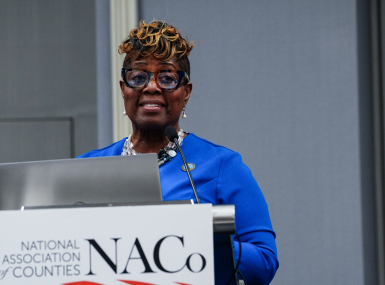NACo teams with FCC to spread awareness of the Emergency Broadband Benefit program
Author
Upcoming Events
Related News

Key Takeaways
NACo is teaming up with the Federal Communications Commission (FCC) to help spread awareness of the Emergency Broadband Benefit (EBB) program. EBB is a temporary program that provides eligible households a benefit of up to $50 off their monthly internet bill during the pandemic. Some EBB providers are also offering an additional benefit of up to $100 that can be used to purchase a connected device. A connected device can be a laptop, desktop computer or tablet. Households interested in the EBB program can apply online at www.GetEmergencyBroadband.org.
Teachers and education staff are accessible and trusted sources for dispersing student related resources in our communities, and our partners at the FCC request that county leaders consider sharing information about EBB with schools to distribute at events.
The FCC has also offered to make subject-matter experts available to speak virtually at school events such as:
- County-wide conference calls to parents
- Parent-teacher events
- Back-to-school nights
- Career day events
- PTSA meetings
To request an FCC speaker, please send an email to EBBSpeakers@fcc.gov.
Download EBB materials here. The FCC has also offered to print and mail copies of available materials to your location at no cost to share with your audience. To request printed materials, please send an email to BroadbandBenefit@fcc.gov.
Additional Resources
- NACo Blog: FCC announces new resources and funding opportunities aimed at closing the homework gap during COVID-19
- NACo Blog: FCC releases funding, starts Broadband Benefit Program to aid schools, libraries, rural and low-income residents
- NACo toolkit: Tracking COVID-19 Relief for Human Services and Education Programs
- NACo Broadband Task Force Report: High-Speed Internet Is Essential For All Counties
Resource
Broadband Task Force: High-Speed Internet Is Essential For All Counties

Related News

National Association of Counties Launches Initiative to Strengthen County Human Services Systems
The National Association of Counties (NACo) announces the launch of the Transforming Human Services Initiative, a new effort to help counties modernize benefits administration, integrate service delivery systems and strengthen county capacity to fulfill our responsibility as America’s safety net for children and families.

Congress seeking ‘common-sense solutions’ to unmet mental health needs
Rep. Andrea Salinas (D-Ore.): “Right now, it is too difficult to access providers … and get mental health care in a facility that is the right size and also the appropriate acuity level to meet patients’ needs.”

Prince William County transforms crisis care through "No Wrong Door" approach
Prince William County, Va.’s Crisis Receiving Center is bridging the gap between emergency room care and traditional outpatient care in behavioral crisis response and reducing burden on local law enforcement and hospitals.
